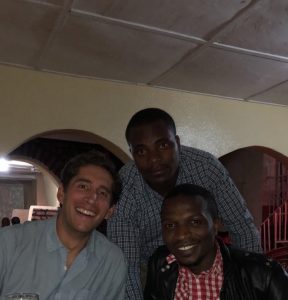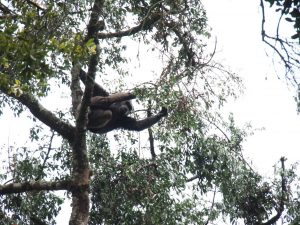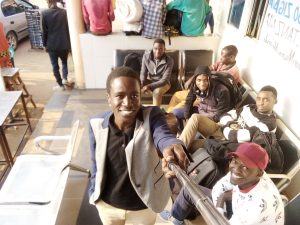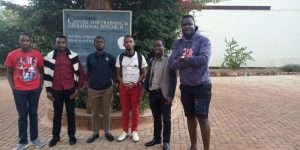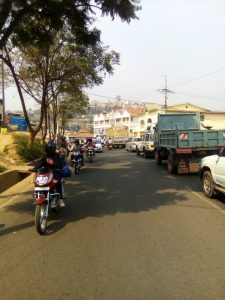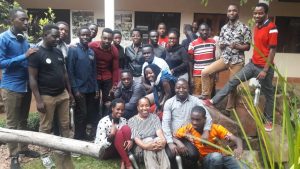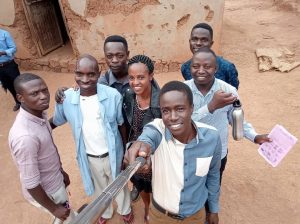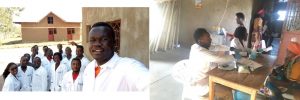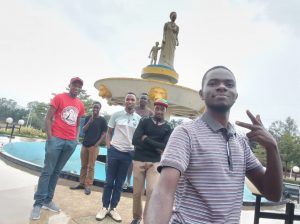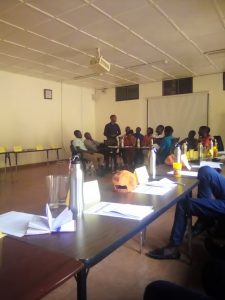New blog by Francis Zerd MD, resident in Anatomical Pathology, Muhimbili University of Health and Allied Sciences (Tanzania) who has complete his elective in Pathology at the University of Rwanda College of Medicine and Health Sciences (Rwanada) through GEMx Electives.
It was a busy morning at our department, when an announcement was made in the departmental meeting about an elective opportunity that we could apply for. I was excited and as soon as the meeting ended I approached my senior and asked for more information. She explained very well what needed to be done, and when I saw Rwanda as one of the options for the elective, instantaneously my brain recalled all the astonishing tales of its beauty from people who have visited, without hesitation right away I started the application process and completed successfully.
Life went back to our normal busy schedules, and a few weeks later an email notification popped up in my phone, it was an email from GEMx that I have been accepted to do my elective in Rwanda. Excitement began, all preparations went smoothly with great support from my home academic staffs. On the evening of September 8th, my journey started at Julius Nyerere International Airport, Terminal 3, Dar es Salaam, with great customer care! I took RwandAir and could see the smiles and kindness in the air hostess faces and started feeling home as soon as I boarded the plane ready to depart to start my elective at University teaching Hospital of Kigali.
I spent an amazing 8 weeks at University Teaching Hospital of Kigali, had a fantastic experience, both in terms of histopathology, the hospital community, the country and its people as a whole. Hopefully this post will give some insight into my elective, and why the experience was so beneficial.
The University teaching hospital of Kigali/CHUK is the largest hospital located in District of Nyarugenge at KN 4 Ave, Kigali City. It is also the biggest referral hospital of the country with a capacity of 519 beds. CHUK provides quality healthcare to the population, training, clinical research and technical support to district hospitals.
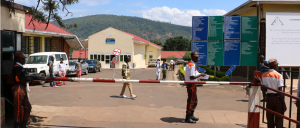
The hospital was built in 1918 and in 1928, it worked as health center and upgraded to a hospital in 1965. From April 1994 to 1996, the CHK served as a health center, a district hospital and as a referral hospital as well. In 2000, with the enactment of law Nr. 41/2000 of 7/12/2000 on the establishment and organization of the University Teaching Hospital “CHUK”, the CHK became a public institution with legal personality known as “University Teaching Hospital of Kigali”
The pathology department at CHUK has been active since 2013, and it has 5 pathologists currently. The normal day at the department starts at 7.15am with a meeting mainly in Tuesdays and Thursdays followed by the day’s allocated duty. Each activity is pre planned in a monthly time table which includes pathologists, residents and laboratory scientists. The main activity for residents are grossing, fine needle aspiration clinics and reporting to pathologists slide findings, usually done using a multi headed microscope where most slide review sessions are done.
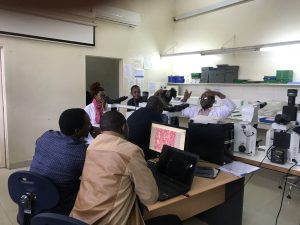
As is customary, the residents at CHUK work on rotation in different hospitals with pathology services in Rwanda. They attend to each for a period of one to three months and there is other opportunity to attend different trainings. I was privileged to visit and work in some of the hospitals for at least a day and privileged to attend one of the trainings. University of Rwanda, Huye campus, Southern province with other GEMx resident from Kenya, Dr Job, Kacyiru hospital which forensic pathology is practiced, King Faisal Hospital, one of the largest referral and the first hospital in Rwanda, University of Rwanda, College of Sciences and Technology (CST) during Molecular Pathology (micro satellite instability and short tandem repeats analysis) training, a 3 days training provided by Promega, Rwanda Military Hospital and Rwanda Biomedical Center (RBC) department, where all molecular tests are done.
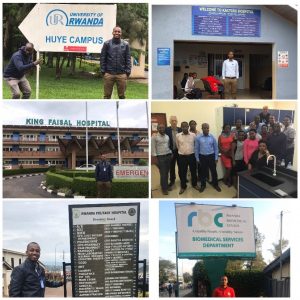
I had an excellent elective at CHUK and would thoroughly recommend it to anyone who would like to get involved in a friendly, welcoming hospital in a developing country, where they will work hard but be well supported during their stay. In terms of a country for your elective, Rwanda is a great place where you will meet wonderfully friendly people and can do some exciting activities, with several must-do attractions.
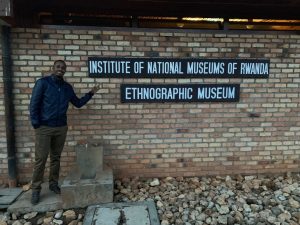
In summary, I had a fantastic experience professionally and yet I also enjoyed immersing myself in the life and culture of the local area, leading to a thoroughly rewarding time.
I would like to thank GEMx-COPECSA for the wonderful opportunity and funding support for my visit and entire stay at CHUK, Ms Phionah for always providing guidance whenever needed, Dr Annette for being there whenever needed and making my stay very comfortable. Special thank the hospital staff especially the laboratory staff and fellow residents for their unspeakable cooperation they have showed me during my stay.
I would also like to thank MUHAS pathology department for giving me permission to attend this life changing opportunity and lastly I give my special thanks to my supervisor and mentor, Dr Edda Vuhahula for introducing me to this program, her encouragement and endless support whenever needed, may you all be overwhelmingly blessed.
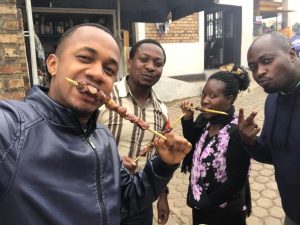

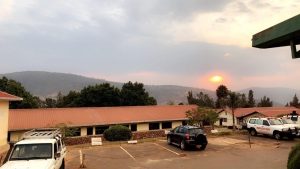 options. I had a few friends living in Kigali, so I arranged to stay with them, but Airbnb and limited international student housing are also available. My colleagues at the hospital quickly made me feel welcomed and provided all the information I would need regarding where to stay and how to get around. On the first day, several of them accompanied me to the nearest market to ensure that I could get my phone and data plan set up. I cannot speak highly enough of my fellow students. Their hospitality and willingness to support me while dedicated to the rigors of medical school were fundamental to my experience and I look forward to the day when I can repay the favor.
options. I had a few friends living in Kigali, so I arranged to stay with them, but Airbnb and limited international student housing are also available. My colleagues at the hospital quickly made me feel welcomed and provided all the information I would need regarding where to stay and how to get around. On the first day, several of them accompanied me to the nearest market to ensure that I could get my phone and data plan set up. I cannot speak highly enough of my fellow students. Their hospitality and willingness to support me while dedicated to the rigors of medical school were fundamental to my experience and I look forward to the day when I can repay the favor. 